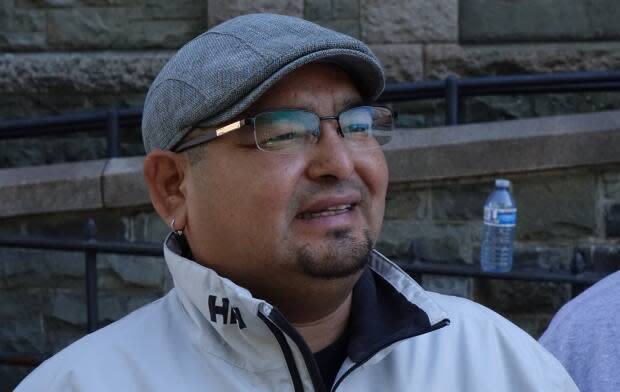'We shouldn't be here': Decision on injunction to block Muskrat Falls mitigation deal expected this week


A Supreme Court decision on a case that threatens to derail the Muskrat Falls rate mitigation deal is expected this week — a matter Innu Nation Grand Chief Etienne Rich says should have never gone to court.
The Innu Nation is seeking a court injunction that would halt talks to finalize a $5.2-billion agreement-in-principle between Canada and Newfoundland and Labrador, signed July 28.
Rich says the framework of that deal was created without proper consultation.
"If we're in the process of moving forward, we shouldn't be here," Rich told reporters outside the St. John's courthouse Friday.
"When the Newfoundland and Labrador government talks about collaboration... there is no collaboration, because this is where we end up."
The deal involves a combination of new money and refinancing arrangements, and promises to reduce the province's cost of financing Muskrat Falls debt. The deal would keep electricity rates from almost doubling when the megaproject's power starts flowing through the grid.
Government officials expected the mitigation deal to be signed by Sept. 30, but the Innu Nation filed its lawsuit asking for an interim injunction to prevent that from happening.
Rich said a lack of consultation from government has directly impacted the Innu people, and will continue to do so financially over future generations. The Innu Nation would not say how much money it believes it will lose as a result of a mitigation agreement.
However, Rich said the court process isn't entirely about money or land — it's about addressing a harmed relationship between the Innu and the province.
"I thought I had a really good working relationship with the premier of Newfoundland… I told him to give us a heads up if there's any talks about rate mitigation. In front of my face, he said no one had talked, and then six weeks after this is what happened," Rich said.
Government does not have duty to consult with Innu: lawyers
As part of the Innu Nation's lawsuit, the group says Canada and Newfoundland and Labrador have a duty to consult the Innu in Muskrat Falls mitigation talks and asked Judge Alexander MacDonald to send the question to a trial.
Federal lawyers argued the point Friday, saying there is no reason to go to trial.
Rich and the Innu Nation strongly disagree, and hope an injunction will push governments to consult with them.

"The Innu have made it very clear all along if we can sit down and have a fair table to talk and a fair process to talk about these things. We'll do that. I certainly don't want to be here arguing before the court and you've heard the Grand Chief talk about reconciliation," Innu Nation Lawyer Nancy Kleer said.
"Reconciliation is not worked out in court, seeking blunt instruments of injunctions."

MacDonald's decision is expected this week.
If an injunction is not granted, Rich said it would show a disrespect of the Innu Nation from government and pushed a need for future collaboration.
"I think they need to take us seriously, because as an Innu Nation I think it's a very big part of our rights to be honoured in our ideas and the other agreements that we have," Rich said.
"These are very dependable for our nation and the future generations for young people...These are the kinds of things that future generations will very depend on," he added. "If they really want to build back the working relationship and the trust…these are the kind of things that we need to look for."

 Yahoo Movies
Yahoo Movies 